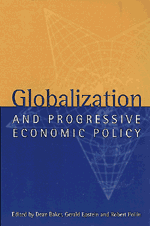Book contents
- Frontmatter
- Contents
- List of figures
- List of tables
- List of contributors
- Editors' acknowledgments
- 1 Introduction
- I The IMF, the World Bank, and neo-liberalism
- II Foreign direct investment, globalization, and neo-liberalism
- III Globalization of finance
- IV Trade, wages and the environment: North and South
- V Migration of people in a global economy
- VI Globalization and macroeconomic policy
- 16 The NAIRU: is it a real constraint?
- Comment by Robert Eisner
- 17 Internal and external constraints on egalitarian policies
- Comment by Robert Blecker
- 18 The effects of globalization on policy formation in South Africa
- Comment by Keith Griffin
- 19 Can domestic expansionary policy succeed in a globally integrated environment? An examination of alternatives
- Comment by J. Bradford DeLong
- Bibliography
- Index
Comment by Robert Eisner
Published online by Cambridge University Press: 04 August 2010
- Frontmatter
- Contents
- List of figures
- List of tables
- List of contributors
- Editors' acknowledgments
- 1 Introduction
- I The IMF, the World Bank, and neo-liberalism
- II Foreign direct investment, globalization, and neo-liberalism
- III Globalization of finance
- IV Trade, wages and the environment: North and South
- V Migration of people in a global economy
- VI Globalization and macroeconomic policy
- 16 The NAIRU: is it a real constraint?
- Comment by Robert Eisner
- 17 Internal and external constraints on egalitarian policies
- Comment by Robert Blecker
- 18 The effects of globalization on policy formation in South Africa
- Comment by Keith Griffin
- 19 Can domestic expansionary policy succeed in a globally integrated environment? An examination of alternatives
- Comment by J. Bradford DeLong
- Bibliography
- Index
Summary
Karl Marx indicated that capitalism required a “reserve army” of unemployed. Without it, workers would force wages up to the point that there would be no profits and the system would collapse. Much of the financial community and its outpost in the Federal Reserve, aided and abetted by a disturbing proportion of the economics profession, seem to accept this Marxian doctrine.
In its modern form it is known as the NAIRU, the “non-accelerating-inflation rate of unemployment.” Adherence to this dismal dogma may not destroy the system, but it robs it of much of its potential for growth while dooming millions of workers unnecessarily to the disaster of joblessness.
Simply enough, the theory, going back some 30 years now to Milton Friedman and E.S. Phelps, tells us that there is nothing to do to get unemployment below its “natural rate.” Efforts to do so by fiscal stimulus or monetary easing might at best bring a very temporary increase in jobs but at the cost of not just more inflation but continuously accelerating inflation. When the attempts to keep unemployment lower are finally abandoned, inflation will settle at its new higher rate, and the only way to get it back where it was is to suffer equal periods and magnitudes of unemployment above the natural rate. What is worse, the dogma tells us, if somehow unemployment slips below its natural rate, the genie of accelerating inflation will be out of the bottle, with all its baleful consequences.
- Type
- Chapter
- Information
- Globalization and Progressive Economic Policy , pp. 388 - 390Publisher: Cambridge University PressPrint publication year: 1998



